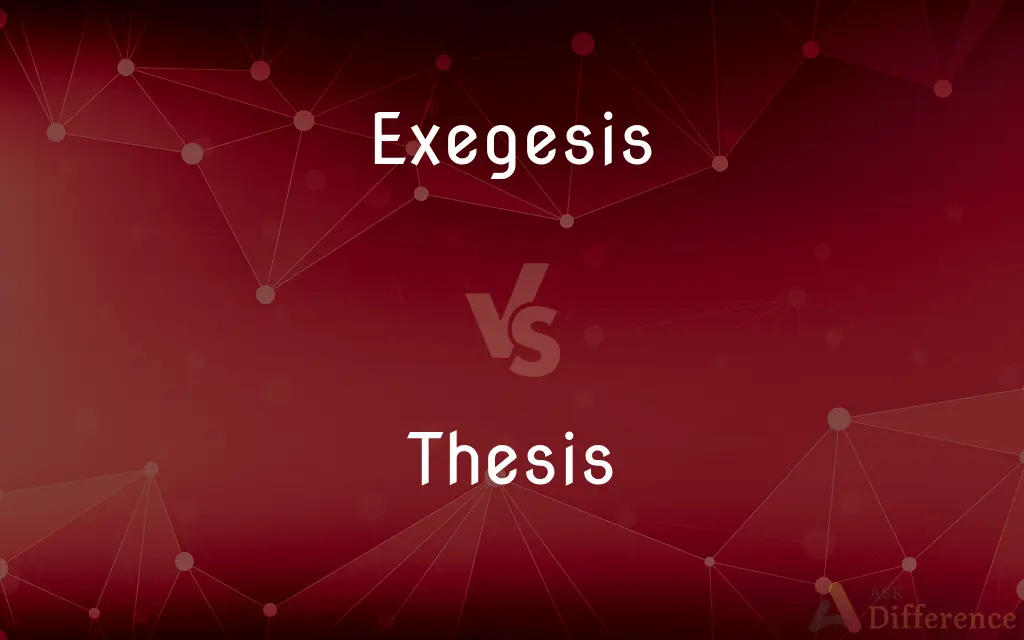Exegesis vs. Thesis — What's the Difference?

Difference Between Exegesis and Thesis
ADVERTISEMENT
Compare with Definitions
Exegesis
Critical explanation or analysis, especially of a text.
Thesis
A thesis, or dissertation (abbreviated diss.), is a document submitted in support of candidature for an academic degree or professional qualification presenting the author's research and findings. In some contexts, the word "thesis" or a cognate is used for part of a bachelor's or master's course, while "dissertation" is normally applied to a doctorate.
Exegesis
A critical explanation or interpretation of a text, especially a religious text.
Thesis
A proposition that is maintained by argument.
Exegesis
An explanatory note; a gloss.
ADVERTISEMENT
Thesis
A dissertation advancing an original point of view as a result of research, especially as a requirement for an academic degree.
Exegesis
Exposition; explanation; especially, a critical explanation of a text or portion of Scripture.
Thesis
A hypothetical proposition, especially one put forth without proof.
Exegesis
The process of finding the roots of an equation.
Thesis
The first stage of the Hegelian dialectic process.
Exegesis
An explanation or critical interpretation (especially of the Bible)
Thesis
The long or accented part of a metrical foot, especially in quantitative verse.
Thesis
The unaccented or short part of a metrical foot, especially in accentual verse.
Thesis
(Music) The accented section of a measure.
Thesis
Senses relating to logic, rhetoric, etc.
Thesis
(rhetoric) A proposition or statement supported by arguments.
Thesis
(by extension) A lengthy essay written to establish the validity of a thesis (sense 1.1), especially one submitted in order to complete the requirements for a non-doctoral degree in the US and a doctoral degree in the UK; a dissertation.
Thesis
A conjecture, especially one too vague to be formally stated or verified but useful as a working convention.
Thesis
(logic) An affirmation, or distinction from a supposition or hypothesis.
Thesis
(philosophy) In the dialectical method of Georg Wilhelm Friedrich Hegel: the initial stage of reasoning where a formal statement of a point is developed; this is followed by antithesis and synthesis.
Thesis
Senses relating to music and prosody.
Thesis
The action of lowering the hand or bringing down the foot when indicating a rhythm; hence, an accented part of a measure of music or verse indicated by this action; an ictus, a stress.
Thesis
A depression of the voice when pronouncing a syllables of a word; hence, the unstressed part of the metrical foot of a verse upon which such a depression falls, or an unaccented musical note.
Thesis
A position or proposition which a person advances and offers to maintain, or which is actually maintained by argument.
Thesis
Hence, an essay or dissertation written upon specific or definite theme; especially, an essay presented by a candidate for a diploma or degree.
I told them of the grave, becoming, and sublime deportment they should assume upon this mystical occasion, and read them two homilies and a thesis of my own composing, to prepare them.
Thesis
An affirmation, or distinction from a supposition or hypothesis.
Thesis
The accented part of the measure, expressed by the downward beat; - the opposite of arsis.
Thesis
The depression of the voice in pronouncing the syllables of a word.
Thesis
An unproved statement put forward as a premise in an argument
Thesis
A treatise advancing a new point of view resulting from research; usually a requirement for an advanced academic degree
Share Your Discovery

Previous Comparison
Wiz vs. Wizard
Next Comparison
Axial vs. Lateral













































